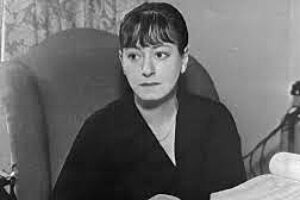I’ve been a life-long admirer of Stephen Sondheim. Through my years of correspondence with him, he has given me invaluable advice and encouragement in my career as a composer/playwright/lyricist. However, on reading his marvelous book on lyric writing, Finishing the Hat (which I used as a master class to improve my own lyric writing), I came upon a discussion in his introduction that completely shattered me:

Music tends to hammer light verse into monotony or shatter its grace. It would seem easy to set Dorothy Parker’s “Comment” to music: “Oh, life is a glorious cycle of song./ A medley of extemporanea;/ And love is a thing that can never go wrong;/ And I am Marie of Roumania.” The trouble is that she’s already done it. The jauntiness of the rhythm perfectly balances the wry self-pity of the words. Music doesn’t understate, that’s not its job: it’s job is to emphasize and support the words or, as in opera, dominate them. Thus any accompaniment, whether light or lyrical is likely either to turn Parker’s irony into a joke or to drown it in sentimentality. Light verse is complete unto itself. Lyrics by definition lack something; if they don’t they’re probably not good lyrics.
Why should this statement upset me so? Well, because I had spent years writing a one-person musical about Dorothy Parker, called, You Might as Well Live. In the piece, I set about twenty of her “light verses” to music. I did breathe a sigh of relief that I did not set “Comment,” the poem mentioned above. Nevertheless, the verses I did set follow this same pattern described by Sondheim: “emphatic rhythms, ringing rhymes, repeated refrains. . .In fact light verse, like ‘serious’ poetry (Ah, horrors! I’ve also spent my life setting such poems.) is diminished by being set to music. Music either thuddingly underlines the dum-de-dum rhythms or willfully deforms them, trying to disguise the very singsong quality that gives the verse its character.”

You Might as Well Live has been performed at the Harris Theater of Music and Dance in Chicago, the New York Musical Theater Festival, and the Orlando Shakespeare Theater, among others. In all those years, it’s jazz-inflected music has nearly always been praised. The highly respected Chicago critic, Albert Williams, wrote:
With its bouncy rhythms and cleverly rhymed couplets, this material is well suited to the classic American show-tune style, as composer Norman Mathews proves in You Might as Well Live. . .Mathews’s jazzy settings highlight the mix of urbane wit, anxious yearning, and satiric gallows humor that makes Parker’s ruminations on sexual folly and emotional dependency as fresh today as when they were written in the 1920s and ’30s … the score is packed with delicious new numbers in the sassy, sophisticated vein of Porter, Sondheim, and Rodgers and Hart.
Feeling both wounded and defensive, I wrote to Sondheim about this and asked him to listen to some of my music from the show. I wanted to know if he felt that I had fallen into the trap that he described. Although in the past, he always listened to my work and answered my questions, in this case I got no response. I had learned from Tony-Award-Winner Michele Pawk, who has so marvelously played Mrs. Parker in my piece, that you never press Stephen Sondheim to comment on something he doesn’t want to talk about. Thus, needless to say, I disagree with him on this particular point and yet never had any sense of resolution on this controversy.
Settling the Score
It would be interesting and instructive to me if my readers would give me an opinion as to whether Sondheim was right about setting Mrs. Parker or whether I avoided the pitfall. I believe I chose poems that did not force me into a singsong rhythm, yet I was careful to maintain the integrity of the verses. Below is a link to a recording of about half the songs from the show, which were recorded by Broadway and cabaret luminary, Karen Mason, who has also given wonderful performances of the musical. Please let me know how you feel about this controversy and which of us you think is right. (Note: the first track, Dorothy’s Theme, is strictly instrumental and therefore does not apply to this discussion). Please respond either in the comments section below or by emailing me at info@normanmathewsauthor.com Anyone who responds and provides an email address will receive a free, first chapter of my autobiography, The Wrong Side of the Room: A Life in Music Theater, which provides a deeper look into the development of that musical.
You Might as Well Live Recording at the top of this link.
Also, there are some previously unrecorded songs from the show (Observation; A Pig’s-Eye View of Literature; Epitaph for a Darling Lady, Interior; Inventory; Song of the Wilderness) all sung and played by the composer. These will be found here under the album title, Mathews Sings Mathews.




